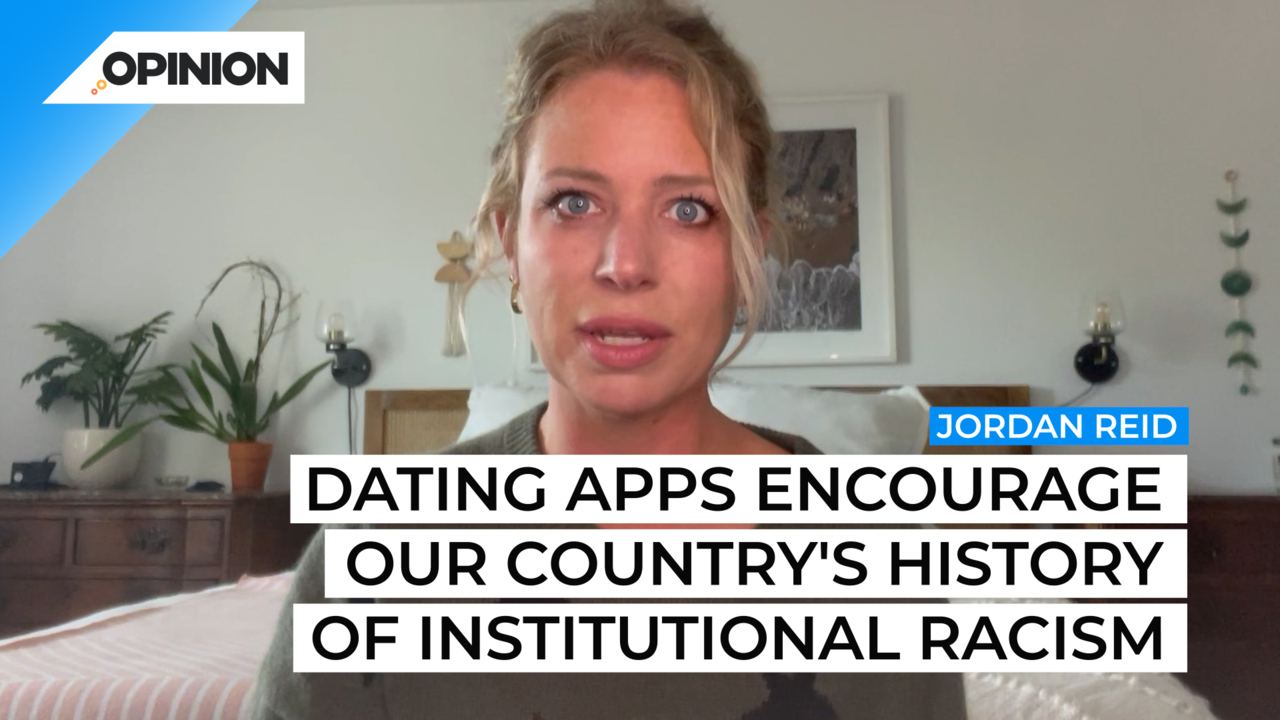
Commentary
-
Our commentary partners will help you reach your own conclusions on complex topics.
I’ve been divorced for about four years, which means that I am way more familiar with the dating app landscape than I ever hoped to be in my forties. And it’s…really something.
Forget about the age liars – it’s a thing – catfishers, and truly astounding numbers of men wearing fedoras…one of the most striking things to me right off the bat was how quickly and directly dating apps ask you to confront your so-called “preferences.”
Do you want a non-drinker? Someone who dabbles in hallucinogenics? A farmer – and only a farmer? There’s an app for that. But even the most seemingly egalitarian apps often ask you right off the bat what gender, age, religion, and – yes – race you prefer. Which can be a jarring question to be asked to answer outright, whether it’s something you’ve ever consciously given thought to or not.
On Hinge, for example, you can mark your preferred race or races, and then indicate whether race is a “dealbreaker” or not. And that’s just…okay, according to a lot of apps, and a lot of users.
Because – of course – the mechanics underlying dating apps, like so many other societal institutions – are deeply rooted in institutionalized racism.
According to Celeste Curington, co-author of The Dating Divide, race is a huge component of online dater’s choices almost across the board – a fact that is in itself differently acknowledged along racial divides.
If you tell people of color that studies show that online dating benefits white people the most and Black people the least, with other races tending to fall somewhere in between, they’ll probably be less-than-shocked, while white users – especially ones who identify as progressive – may resist confronting their conscious or unconscious preferences and biases.
In 2020, a number of dating apps – including Grindr – removed so-called “ethnicity filters” in the wake of the Black Lives Matter protests following the murder of George Floyd. But the filters only go so far – even in their absence, users can of course swipe right or left based on whatever they want.
Those who hold that incorporating racial preferences into online dating is a valid choice tend to equate them to, say, a preference for a certain type of cuisine – ignoring the obvious fact that the rejection of an entire group of humans based on their racial or ethnic makeup isn’t exactly the same as not being super into jalapenos.
What it comes down to is that dating apps, on their surface, have the potential to subvert social structures, including racial profiling, but when they incorporate features that allow you to literally see only people who are similar to you, that disruptive effect evaporates.
The solution here isn’t necessarily clear cut: Spokespeople for companies that utilize the filters hold that they are useful for minority users looking to find other users with similar ethnic backgrounds. Further, not all preferences are problematic – a white woman saying she only wants to date men with blonde hair and blue eyes is different than a Black woman saying that she prefers dating Black men because she wants to avoid the prevalence of racism and fetishization of Black women that’s so often found on these sites.
But institutions – including dating apps – should not present users with the ability to virtually surround themselves solely with individuals of a given race, and then double down on the effect with algorithms that reflect these biases. When you look at it that way – just how deliberate and systemic the selection system is, and the degree to which it permits and even encourages our country’s longstanding history of institutional racism – the issue isn’t really all that complicated after all.
-
Americans must reject Trump to defend our democracy
At the end of the Republican National Convention, Donald Trump accepted the nomination as the GOP candidate for president. In the first part of his acceptance speech, Trump called for unity and healing, although he derailed into partisanship as he continued. Critics have debated the media’s role in handling Trump’s speech. Some argued he was…
-
It’s time for Kamala Harris to pick up the torch
Debates have continued among Democrats about whether President Joe Biden is the best candidate for the 2024 election or whether an alternative Democratic leader might be more electable. While there’s no shortage of fellow Democratic leaders to choose from, President Biden and his supporters have continued to assert that Biden can and will win as…
-
Republicans want to sabotage US education
Former President Donald Trump’s official educational policy platform reveals plans to eliminate the Department of Education and seize the financial assets and endowments of elite U.S. universities. These proposals and others have convinced some liberal critics that the true goal of Republicans is to intentionally weaken U.S. education. Watch the above video as Straight Arrow…
-
Despite poor debate performance, Biden deserves our support
President Joe Biden himself admits that he delivered a “bad” performance in the first 2024 presidential debate. About a week after what some consider to be the worst debate performance in the history of televised debates, polls indicate that more voters than ever have an unfavorable opinion of the president, believe he is too old…
-
The modern-day Republican woman has terrifying role models
In a recent New York Magazine cover story entitled, “How Did Republican Women End Up Like This,” Rebecca Traister writes about some of the more polarizing examples of female Republican leaders and their positions on abortion, the transgender movement and women in general. With Republican women set to play a major role in the November…
Latest Opinions
-
 U.S. Department of Defense
U.S. Department of Defense
Congress still trying to figure out how to reduce wasteful military spending
-
 DVIDS
DVIDS
US Navy, Air Force making waves with new weapons at RIMPAC
-
 Getty Images
Getty Images
Israeli PM Netanyahu meets with Trump at Mar-a-Lago
-
 Getty Images
Getty Images
Growing US nuclear power resurgence reaches the nation’s heartland
-
 Getty Images
Getty Images
Beer from the sun, other solar thermal projects get government funding
Popular Opinions
-
In addition to the facts, we believe it’s vital to hear perspectives from all sides of the political spectrum.


